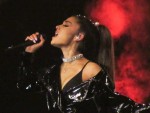No thank u, next video.
Ariana Grande recently released a troublesome new music video for “break up with your girlfriend, i’m bored” featuring the singer observing a supposed love interest with his girlfriend. Complete with a slicked-back high ponytail and almost matching makeup, the opposing actress could easily be mistaken for Grande if you squint just enough. The resemblance is clearly purposeful – one scene with a mirror even switches between both women’s reflections, driving home the comparisons a bit too hard. Up until the end, it could be interpreted as Grande’s obsession with the couple, presumably fixating on the man’s relationship.
In the final frame, however, Grande leans toward the other girl, almost but not quite kissing her before the screen cuts to black. The video has prompted some to tweet, accusing it of queerbaiting, saying the act was “nothing new or shocking sadly. #thankyounextalbum.”
Most often seen in film and television, queerbaiting refers to the inclusion of almost, but not quite, queer relationships – hinting at a possibility but never actually depicting a relationship – in order to appeal to LGBTQ audiences. In the past, other female artists have also come under fire for such questionable representation. Demi Lovato’s “Cool For the Summer” places two actresses in a queer relationship despite the lyrics hinting at Lovato herself being in a relationship. Combined with the problematic lyrics – “Don’t tell your mother” – the video further establishes the noncommittal trope of bisexuality, implying queer relationships are a quick fling and meant to be hidden.
Grande’s supporters argue the female love interest’s resemblance to Grande implies the music video simply is representative of her focus on self-love instead of relationships. If so, her attempt at illustrating the concept leaves much to be desired, especially in comparison to other artists who have successfully shared related messages.
Though there was no accompanying music video, Lorde explored a similar topic in “Liability.” In the song, she says she will go home “Into the arms of the girl that I love/ The only love I haven’t screwed up,” only to reveal that the love interest actually is “one girl swaying alone/ Stroking her cheek” – essentially, it is Lorde herself.
Lorde’s depiction of the concept in a straightforward manner shows that it is not the premise of Grande’s video that is problematic, but the execution. The ploy works lyrically within Lorde’s song as the singer laments her inherent need for self-love because she is rejected by others. In “break up,” the supposed self-love is not immediately evident, particularly when considering the focus on romantic relationships of others. Instead, it feels like the visual representation of clickbait – meant to be a bold plot twist instead of a thoughtful message. Though a tad self-obsessed, the music video clearly lacks any self-awareness.
In “thank u, next,” a single off the same album, Grande references falling in love with someone named “Ari,” but the attempt at replicating the prior song’s depth in “break up” comes across as cheap instead of thoughtful. Lyrically speaking, the song also is problematic – prompting someone to break up with their significant other doesn’t exactly promote healthy relationships. Grande herself has acknowledged that the song was just meant to be fun, but paired with the scene at the end, the lyrics take on a new meaning.
Even the titular lyric – “break up with your girlfriend/ … ’cause I’m bored” – implies that a romance between two women only comes as a bored afterthought of a heterosexual relationship. The music video places a female bisexual relationship in the shadow of a man who merely is a supposed love interest; these women are not allowed to love on their own but must instead exist within the context of the man who connects them.
Since the video does depict a queer relationship, albeit in a negative light, “break up” is not queerbaiting in its most strict definition. But that doesn’t make its feeble attempt at representation acceptable, especially considering that it perpetuates the stereotype that bisexual relationships often emerge as a result of cheating or failed heterosexual relationships, rather than organic love.
Nevertheless, Grande has been an active advocate for the LGBTQ community, writing a letter for Billboard in 2018 stating her love for the community and the support they have given her. She probably didn’t intentionally create an exploitative video meant to depict harmful stereotypes. But members of the LGBTQ community shouldn’t have their sexualities exploited for views.
